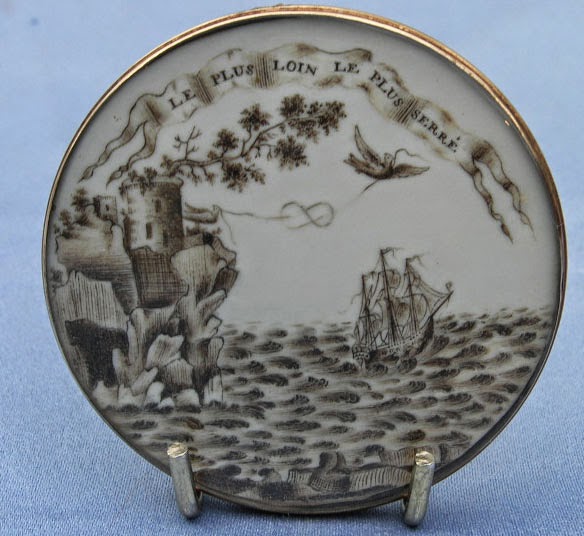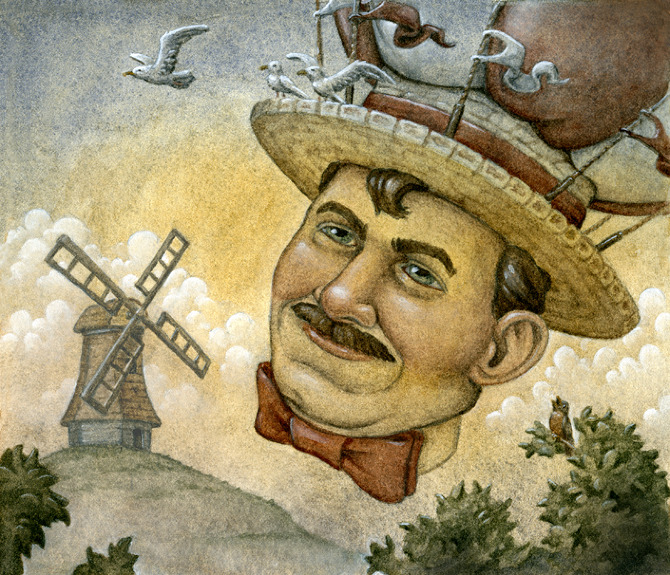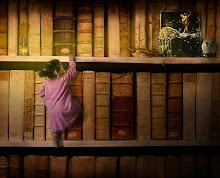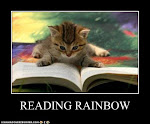On Friday,
the New York Times magazine section
published a “Riff” piece titled “How to Read a Racist Book to Your Kid,” by
Stephen Marche. The link has been passed around a bit on facebook and twitter,
at least in the children’s lit/booknerd circles I move in (electronically, at
any rate). I haven’t seen much discussion of the content of the piece, though,
which surprises me; when I read it the first time, it set off all of skepticism
sensors.
Marche’s
introductory example of an Asterix comic he’s reading to his six-year-old is,
perhaps, a flawed one to begin with: Asterix is a comic and, in my admittedly
limited knowledge of European comics (and comics in general), it’s a general
audience series, not a specifically kid-oriented one. But we’ll grant him that,
and regardless of source, the question Marche’s six-year-old asks is a good
one: “Why do the pirates have a gorilla?”
The “gorilla”
is, of course, a racist representation of an “African.” Marche immediately
fumbles the entire situation – he enumerates his possible responses thus:
“1)
Explain that the gorilla is supposed to be a black person.
2)
Try to explain the history of French colonialism...
3)
Say, “I don’t know why the pirates have a gorilla” and flip to the next page”
Marche
chooses the third choice, the “cowardly” one. I would buy an argument of
readerly expediency, actually, in passing over the question, partly because
of the demands of story, but also
because talking about racism is pretty important, and midway through a story
may not be the ideal time for it. It also might be; it would depend, I think,
on the child, the parent, and the situation (is this the last page before
bedtime? Is the kid overwrought because of something that happened at school
that day? Will introducing the topic now
freak everyone out and be counterproductive?).
Marche
notes his need to develop some kind of response, because “much of the great old
children’s material, like so much of the great old adult material, is either
racist to the core or at least has seriously racist bits.” Yep; that’s true. It’s
also true that a lot of the new adult
and child literature is racist or has seriously racist bits (The Help? The Secret Life of Bees? Virtually
any book featuring a Native
American?). Lots of new and old material is deeply sexist, and classist, and
homophobic, too. But these are problems for another day, it seems, and Marche
never mentions them at all.
Then
things get weird. Marche explains that “some decisions are easy,” like Little Black Sambo, and Tintin in the Congo. “As parents, we
know what to do with this stuff: Certainly never show it to young kids.” This
decision, Marche tells us, is made even easier by the fact that the texts are “lousy.”
There’s no real loss in never reading either, according to Marche. I can’t
speak to the Tintin book, having never read it, but I’ll accept that Little Black Sambo is maybe not the most
riveting, life-changing text I’ve ever read. I’m uncomfortable though with both
Marche’s claim that these texts should “never” be shown to young kids, and his
classification of some texts as lousy, and some as good. Literary value
judgements are never ideology-free; there’s no natural order of Great
Literature and Crummy Books, and everyone can see the distinction for
themselves. Canon formation isn’t much of a hot topic in literary circles these
days (I hope, anyway), but it’s worth emphasizing that, like history, canons
are created by the “victors.” There’s a reason why so many dead white men
populate literary anthologies, and it may, just may, have something to do with the fact that for hundreds and
hundreds of years, the people with power in Western culture have been white
men.
Marche
moves on to more complex texts: “material that is otherwise excellent but
contains significant racist passages. Michael Chabon recently wrote about
negotiating (and ultimately eliminating) the racial epithets while reading “The
Adventures of Huckleberry Finn” to his kids, following a painful and honest
discussion about it with them. I admire his spirit of openness, but I have to
admit I would never have had the stomach to imitate him — either in the willful
alteration or the discussion about it.”
Michael
Chabon, of whose books I have only read a few, is a good writer, but is also
laboring under the misapprehension that he is the first person to have and
raise children, and also has special wisdom related to having and raising
children (hint: people have been successfully raising decent humans for
literally thousands of years). I don’t know how old Chabon’s kids are, but I’m
a smidge perplexed about reading Huck
Finn out loud to them – if they are young enough that being read to is
still acceptable practice (acceptable to them, I mean; it’s hard for me to
picture teenagers willing to have their dad read to them), then they are
probably too young to really get a grip on Huck
Finn, which, despite having a child narrator/protagonist, is not a children’s book. It just isn’t.
Twain is smart and sarcastic and speaks to a sophisticated reader;
thematically, Huckleberry Finn
requires a great deal of historical and social context of its modern reader,
not to mention well-developed reading skills. It’s a hard book to read well, and part of reading well lies in
understanding its complexity. So why Chabon chooses Huck Finn, when his local library is crammed with excellent fiction
for children and young adults, is beyond me.
More
disturbing is Marche’s admission that he couldn’t “stomach” the discussion
and/or removal of the n-word from Huck.
Really? You can’t stomach explaining to your child that this a word that has a
very bad history, that means something not at all nice, and so you’re going to
avoid saying it? Kids know the world is full of nastiness, and they also know
there’s a huge list of things they’re not allowed to say; it’s why kids of a
certain age glory in saying “poop!” and making butt jokes. But not being able
to stomach explaining the racist history of a racist term – which can be done
very simply – it’s a very bad word used to make black people feel terrible, and
so we don’t say it – that is
pathetic. Is it easier to stomach racism itself?
After
giving some more examples – the excised black centaur-slave in the “Pastoral”
sequence of Disney’s Fantasia, Pippi Longstocking, the Oompa-Loompas –
Marche drops this staggering set of ideas:
“We rewrite the past to serve
the needs of the present. The clarity of history is its great advantage.”
“The
clarity of history”? Whose history is so clear? History is deeply
muddy, murky, and endlessly complex.
Perhaps Marche means something more like “hindsight” than “history,”
though frankly that’s problematic too.
Equally troubling is his blithe statement that we rewrite the past to
serve the needs of the present. I’m not at all comfortable with this; we’re
already a culture that can’t seem to remember more than a few years back. I am
continually appalled by my students’ (and lots of other people’s) lack of
historical knowledge. It isn’t just dates and names and facts; history is context. It’s being able to look at a
set of historical events, and make connections, and relate those to the present
moment – to say, because that happened,
and had those effects, we have this idea/institution/etc now. My
students, when I ask them why we should know history, default to that gross cliché
about not repeating history’s mistakes. This is faulty thinking, and whoever
came up with that truism should be placed inside permanent weaselpants.
Removing racist images from children’s books doesn’t remove racism; it removes
the memory of racism. It removes the
context for a whole slew of practices and problems we deal with every day now.
Marche
moves on, pointing out the discussions about the colonialism inherent in the
Babar books (which books I loved as a kid; what stuck with me about them was
their French-ness, not their colonialist elephant policies). For Marche, the
Babar books are boring, and also, “My son won’t be turned into a more effective
colonist by stories of elephants riding elevators.” Again, he picks and chooses
with his examples. Racism – cartoons of “gorilla” Africans – is Bad; quiet
colonialism isn’t a problem. To be fair to Marche, his child will be made a
more effective colonist by the endless repetition of American exceptionalism
that one encounters virtually everywhere in the United States; but the problems
of Babar are still there.
Star
Wars is more interesting than dull old Babar, but also alarming for Marche, who
is clearly a weak man: “The conundrum is how to explain to your kids that Jar
Jar and Watto are stereotypes without first introducing the stereotypes that
you are hoping to negate.”
If
Marche thinks that somehow he’s going to be able to avoid introducing
stereotypes to his kids, he’s going to be a very sad and surprised man. Those
stereotypes are everywhere. They are
a part of history, and erasing them from kids’ movies and books isn’t going to
mean they never happened and don’t have effects today. Far better to explain the problems of the
stereotypes at the moment the child discovers those stereotypes exist, then to
come years after the fact to trying to explain why those things are
problematic. Some you can let go, for expediency’s sake – the example of the “Italian”
grocer-monster in Monsters Inc; he’s
a walk-on (or squelch on, since he’s tantacular) character who only appears
that one time, very very briefly. If the kid questions it, explain. If the kid
starts using that mock Italian accent, put an end to it right away. Simple as
that.
“Stereotypes
are part of what children want from stories, which of course connects to what
we all want from stories: simplification.”
Oh
lord. Where to start with this? Marche offers no support for his assertion
about stereotypes and simplification, and simultaneously reveals the narrowness
of his own thinking. Simplification is what he wants from stories? Well, have
at it, Mr. Marche. I myself prefer my stories to be knotty and complex and
perplexing and troubling. A simplified world is a false world, whether it’s in
comic books or novels or film. There are types,
as in archetypes, and tropes, in
fiction all over the place, and those are useful placeholders for general
experiences (I don’t say universal, because what can that even mean? ). These
don’t need to be stereotypes – the princess in the tower can be anyone or
anything – she can be an Ogre or a boy or a fancy blonde who loves pretty
things.
To
assume that children – and everyone else – want both stereotypes and
simplification is to do a huge
disservice to people everywhere.
But
Marche is already a lost cause, I suspect; he winds down with:
“That familiar
and insoluble knot of moral difficulty is infinitely complicated by the fact
that I’m sharing it with a child. I don’t want to explain the human gorilla and
all the chains of horror that went into that caricature because I’m afraid of
the follow-up questions. Recently as I was laying down ant traps against the
annual spring invasion, my son asked me, “Do ants have souls?” I didn’t have a
good answer for that. What is he going to ask when I explain that for 400
years, white people took black people from their homes in Africa, carried them
across the ocean in chains, beat them to death as they worked to produce sugar
and cotton, separated them from their children and felt entitled to do so
because of the difference in the color of their skin? Whatever he asks next,
I’m pretty sure I won’t have an adequate reply.”
Does
Marche have any beliefs or ideas of his own? Does he have his own set of
values? Why doesn’t he have answers to these questions, which he should have in
some form anyway, simply as a human in the world. DO ants have souls? Well, do
you believe in God? What kind? Do you want your kid believing that? Why not
tell the truth – “I don’t know” ? Being able to say you don’t know something is
hugely meaningful; it is okay to say I don’t know. It’s okay to not have made
up your mind. It’s okay to say: Well, a lot of people have been wondering that
same thing for a really long time. No one has really come to a conclusion. Or
you could do this: Gosh, kiddo, that’s an interesting question – what do YOU
think? Or: Why do you ask that?
Marche’s
inability to face up to the reality of history, in the form of slavery and
systemic racism, is a shocking failure, and he should be embarrassed to admit
it. Yes: it’s a brutal history. It’s appalling. Even a small kid will see that
it’s not nice to take people away from their home and work them to death. You
don’t need to do a whole lot of explaining there, because many kids, provided
they’ve been raised in halfway decent homes, will see the obvious, glaring
injustice of it all. You don’t need to give all the details; you don’t need to
explain the southern economy, the demands of cotton-growing, the clamor for
sugar that drove the West Indian slave trade. What do you say to your kid when
Martin Luther King Junior day comes around? Or Christmas, or Passover, or
whatever you celebrate? You face up to history, the good and the bad. You say: well, you know how for a long time black
people weren’t treated very well? Dr. King worked very very hard with a lot of
other people to make sure that black people were treated better. There – you get
both the grim and the glory of history, in one short response.
Finally,
Marche cops out completely – this essay never does tell us how to read racist books to kids. It dithers around Marche’s
pathetic feelings about passively reading racist books to his kid without
intervening (perhaps we’re meant to intuit the how-to from Marche’s total
failure to handle the situation). His
big conclusion is as appalling as the rest of the article: “I want to shelter
the past too. I’m embarrassed for humanity at all this nonsense, and I don’t
want to submit the world to the complete and perfect judgment of an innocent.
We
all need to grow up, I know. Me, the moviemakers, the audience. The only person
who seems mature enough for the situation is the 6-year old. All he sees is a
gorilla with some pirates.
Again,
where to start? Who wants to shelter the past? Yeah, humanity has been one big
embarrassment to itself since it began. It’s also had a few successes –
Beethoven, and Shakespeare, and whoever invented the printing press in China,
and the Indian mathematicians and astronomers, and the Muslim leaders of the
translation movement. But being embarrassed by history and therefore sticking
your head in the sand is just about the most irresponsible thing you can do,
whether as a parent or as a plain old human being.
Leaving
aside my eye-rolling over Marche’s use of “an innocent” to describe his
six-year-old, his dismissal of racism, colonialism, sexism, oppression, power
disparity, war, violence, anger, hatred as “all this nonsense” is in itself an
act of oppression and racism. The nonsense is in pretending that we can all
smile and sing Kumbaya as if all of history hadn’t happened. It’s a
staggeringly white response, as well –
Marche identifies himself as such with his admission of “white liberal guilt” –
and, I venture, a male response as
well. People speaking from positions of privilege can dismiss centuries of
oppression of others as “nonsense.” It’s not nonsense for the kids who get shot
because of walking down the street while being black; it’s not nonsense for the
women who get blamed for being raped; it’s not nonsense for the people being
surveilled and suspected simply because they are brown.
Taking
the kid’s seeing the pirates and gorilla as a sign of “maturity” is a false
move, as well, and a dangerous one that smacks of the deeply flawed idea that
we all just need to grow up and get over this race business. Perhaps Marche is
one of these people who doesn’t “see” race. I wouldn’t be surprised; he seems committed
to willful obliviousness. What the kid is seeing is the 20th century
relics of centuries of colonialism and racism. Pretending he isn’t seeing that
is a lie. Pretending you don’t need to address it is also a lie. Marche says
that Asterix is too much a part of his own childhood for him to not pass it on
to his son (because, of course, your kid’s childhood is really all about you,
and your nostalgia). He’s also passing on willful oblivion.
One
of the mottos of the producers of Mister Rogers’ Neighborhood – modeled after Margaret McFarland’s saying – is that
attitudes are caught, not taught. If you’ve been modeling nonracist behavior
and attitudes around your kid, she will catch them. She doesn’t need to know
the date of the first slave ship’s arrival in the new world, or a lesson/sermon
on racism; she will have already acquired sensitivity and antiracist ideas from
you. She’ll continue to acquire those ideas – children aren’t dumb, they just haven’t had as much
education and experience as adults – and she will figure out that the gorilla
is a black man. If you’ve done your job right – outside of book-reading time –
she will be appalled by the realization. And she’ll know – because, if you’ve
done your job right, she’ll have a sense of history – that this is one way
white people used to think about black people, that it’s wrong, that people are
working now to make sure no one treats anyone like that ever again.
But
to pretend you don’t know, to hedge, to lie, to “shield” your child from
reality – that perpetuates privilege and ignorance in the worst possible way.
No black child gets to be shielded from racism; why should Marche’s white son
be any different?


















